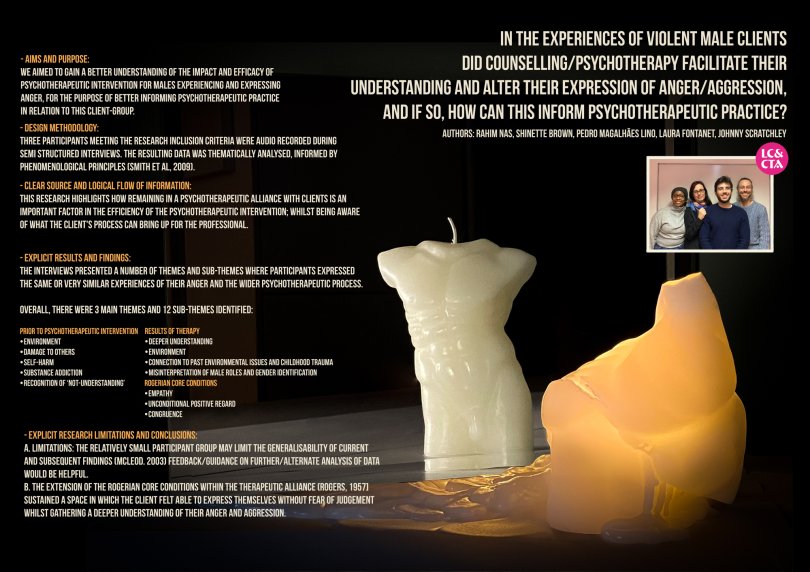2022 National Research Success
ABSTRACT
Presenters: Laura Fontanet, Johnny Scratchley
Other Authors: Rahim Nas, Shinette Brown Pedro Magalhães Lino
Professional Role: Higher Professional Diploma Student/Counsellors in Training
Institution/Affiliation: Lewisham Counselling & Counsellor Training Associates
Email: christine.brown@lcandcta.co.uk
Abstract: Collaborative Student/Tutor – Rapid Paper
Key Words: Anger, self-harm, substance-misuse, trauma-triggers
Title: In the experiences of violent male clients did counselling/psychotherapy facilitate their understanding and alter their expression of anger/aggression, and if so, how can this inform psychotherapeutic practice?

Aim /Purpose: We aimed to gain a better understanding of the impact and efficiency of psychotherapeutic interventions on males’ experiences and expressions of violent anger, for the purpose of better informing psychotherapeutic practice in relation to this client-group.
Design/Methodology: Three participants meeting the research inclusion criteria were audio recorded during semi structured interviews. Our resulting data was thematically analysed, informed by phenomenological principles (Smith et al, 2009).
Ethical Approval: We were granted approval from LC&CTAs Ethics Board before participant recruitment. Participants were offered six no-fee counselling sessions if issues arose due to their research participation. BACP guidelines for research in counselling/psychotherapy were followed (Mitchels 2018).
Results/Findings: Common factors appeared to underpin clients’ seeking psychotherapeutic intervention; these included attempted suicide, the recognition of self-harm, substance-addiction and the damage their anger was causing others. The therapeutic process seemed to offer clients a deeper understanding of their violent anger; respondent commonly developed a connection to past environment issues and childhood trauma. Respondents also commonly expressed having held a misinterpretation of male roles and gender identification. The extension of the Rogerian core-conditions appeared to facilitate clients to feel acceptance while increasing their sense of self-worth and an ability to take greater responsibility for their feelings and actions.
Research limitations: The relatively small participant group may limit the generalisability of current and subsequent findings (McLeod, 2003). Feedback/guidance on further/alternate analysis of data would be helpful.
Conclusions and implications: It appears therapy offered our respondents support in understanding their anger/emotions, processing past trauma, and developing a greater sense of personal responsibility. However, therapeutic effectiveness seems to require supportive and accepting therapeutic qualities in the therapist. Our findings also indicate that practitioners may increase their effectiveness by being mindful of how gender identification/misunderstanding of the ‘male role’ can negatively impact a clients’ self-perception.
Considerations given to issues of equality, diversity and inclusion: We initially explored issues around inclusion criteria, specifically gender-identity, sexuality, migration status and cultural practices. We concluded that although we recognised such diversity considerations for this research all participants needed to be cis-gendered males who had accessed therapy.
Learning objectives: The research will help facilitate understanding of the impact of psychotherapeutic intervention in dealing with anger in males, support clients in distinguishing between anger as a negative or violent/harmful emotion and a part of being, and to identify the importance of gender norms when experiencing/expressing anger.
References
McLeod, J. (2003) Doing counselling research, 2nd Edition. London: SAGE Publications Ltd.
Mitchels, B (2018) Ethical Guidelines for Research on the Counselling Professions. Leicestershire: BACP
Smith, J. Flowers, P. and Larkin, M. (2009) Interpretative phenomenological analysis; theory, method and research. London: SAGE publications Ltd.